Nonalcoholic fatty liver disease (NAFLD) is becoming a big issue. It affects up to 40% in the US. Fat buildup in the liver causes inflammation and can harm the liver. But, you can help your liver with natural remedies and a new lifestyle.
This article will show you ways to help your liver. From changing what you eat to using some supplements and doing more exercises. You’ll learn how to make your liver healthier and maybe even stop fatty liver disease from getting worse.
If you just found out you have NAFLD or want to prevent it, this guide is for you. It will teach you how to use natural ways to take care of your liver. Let’s start a journey to a better, healthier liver together.
What is Nonalcoholic Fatty Liver Disease?
Nonalcoholic fatty liver disease (NAFLD) is when the liver has too much fat. This happens without drinking a lot of alcohol. It’s the most common liver disease around. About 24% of adults in the U.S. have it.
Types of Fatty Liver Disease
There are two main kinds of fatty liver disease. Alcoholic fatty liver disease comes from drinking too much alcohol. Then there’s NAFLD, which isn’t tied to drinking. NAFLD breaks down into two types: nonalcoholic fatty liver (NAFL) and nonalcoholic steatohepatitis (NASH). NASH is more serious and can hurt the liver.
Risk Factors for NAFLD
We’re not sure what exactly causes NAFLD. But, we do know a few things that make it more likely. These things include:
- Obesity
- Type 2 diabetes
- High cholesterol
- High blood pressure
- Genetics and family history
- Insulin resistance
- High triglyceride levels
- Metabolic syndrome
If you have these risk factors, especially if you’re over 50, you might get NAFLD. And if not managed, it could lead to serious issues. These include liver cirrhosis, liver cancer, and end-stage liver failure.
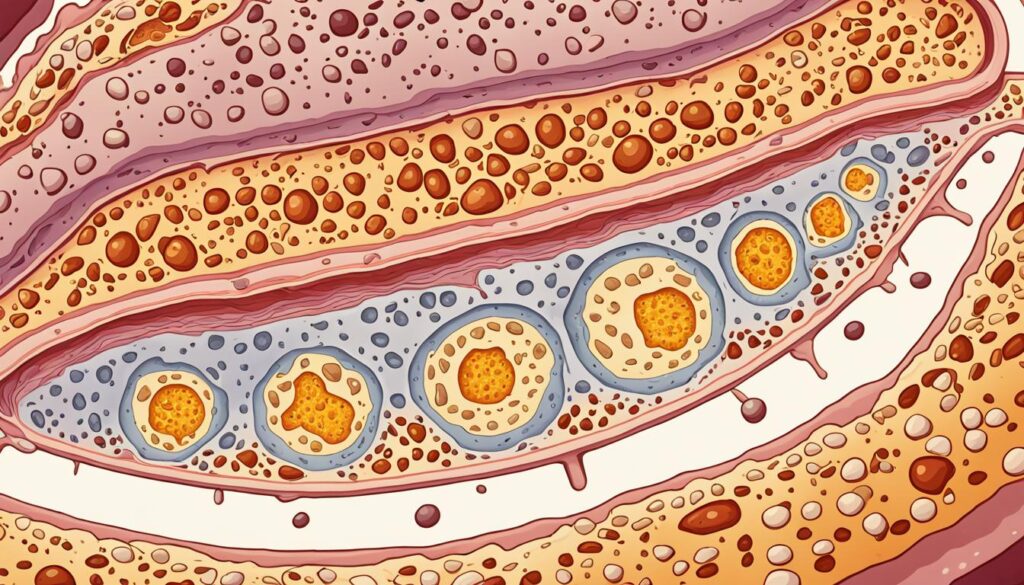
Lose Excess Weight
Losing extra weight helps fight nonalcoholic fatty liver disease (NAFLD). The American Association for the Study of Liver Diseases says shedding 3-5% of weight is a good start. Doing even better with 7-10% weight loss can make NAFLD symptoms less severe.
To beat obesity with NAFLD, aim for steady progress. A balanced diet and regular exercise are key, not quick fixes. Avoid crash diets; they might hurt your liver more. Focus on changes that help you lose weight safely and improve your health.
Benefits of Weight Loss for NAFLD
- Reduces liver fat content
- Decreases liver inflammation
- Improves insulin sensitivity and reduces risk of type 2 diabetes
- Lowers cholesterol and triglyceride levels
- Reverses liver damage and reducing liver fat through weight loss
By dropping some pounds, people with NAFLD make their livers happier. This, along with other healthy changes, can slow down NAFLD’s progress.
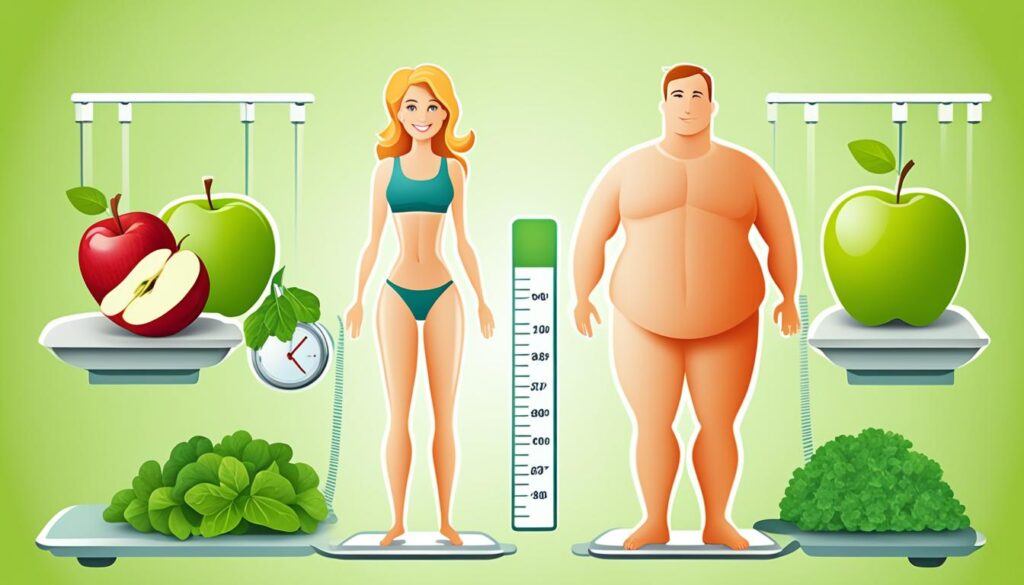
Try the Mediterranean Diet
If you’re fighting NAFLD, try the Mediterranean diet. It helps your liver by lowering liver fat. Even losing weight isn’t the main goal. This diet is all about veggies, fruits, and the right kinds of fats. It’s great for dealing with NAFLD.
Key Components of the Mediterranean Diet
The Mediterranean diet is all about:
- Fruits and vegetables. Pick lots of different colors for good nutrients.
- Whole grains. Go for whole wheat, brown rice, and other whole grains.
- Legumes. Add lentils, chickpeas, and beans to your meals.
- Nuts and seeds. Have a handful as a snack or in your meals.
- Olive oil. It’s the top healthy fat for cooking and dressing your food.
- Fish and seafood. Try to eat fish, especially fatty ones, a few times a week.
- Lean poultry. Chicken and turkey are good foods to add to your diet.
Sticking to these foods helps your liver a lot. You get lots of antioxidants, fiber, and good fats from it. Plus, it helps with high cholesterol and type 2 diabetes, which often come with NAFLD.
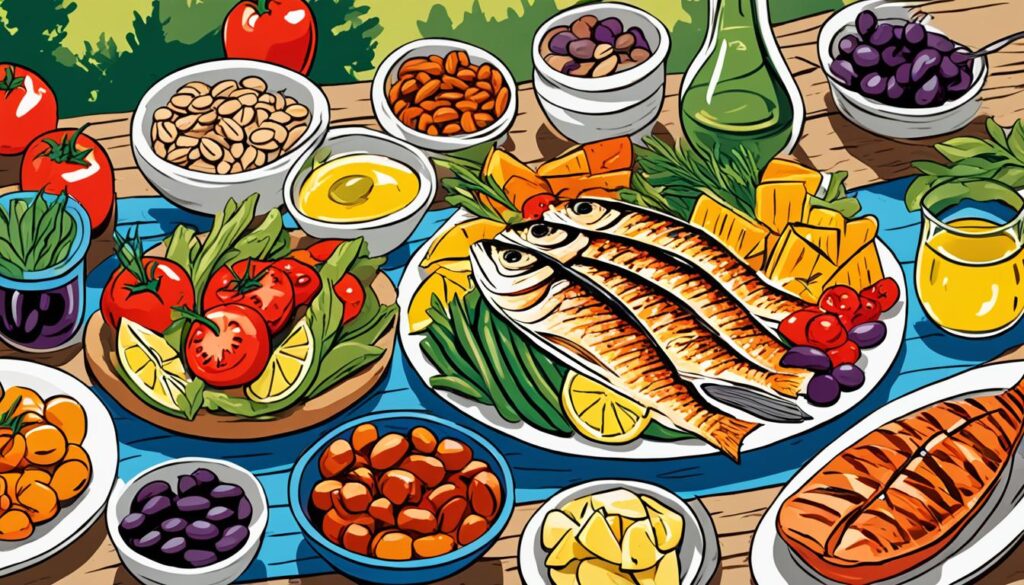
The Mediterranean diet is tasty and good for your liver. It’s about eating more plant foods and the right fats. This approach can help manage NAFLD in a natural way.
Drink Coffee
If you’re fighting NAFLD, coffee could help your liver. Studies show it might lower liver damage and inflammation.
Coffee boosts liver enzymes that fight swelling. Drinking 2-3 cups of black coffee daily seems to work the best for NAFLD.
Coffee doesn’t just lower swelling. It might also help reduce liver damage. Compounds in coffee, like paraxanthine, stop scar tissue growth that causes liver problems.
Make coffee a daily part of your health plan for your liver. Drink it black, without sugar or cream. Also, eat healthy and exercise for better NAFLD management.
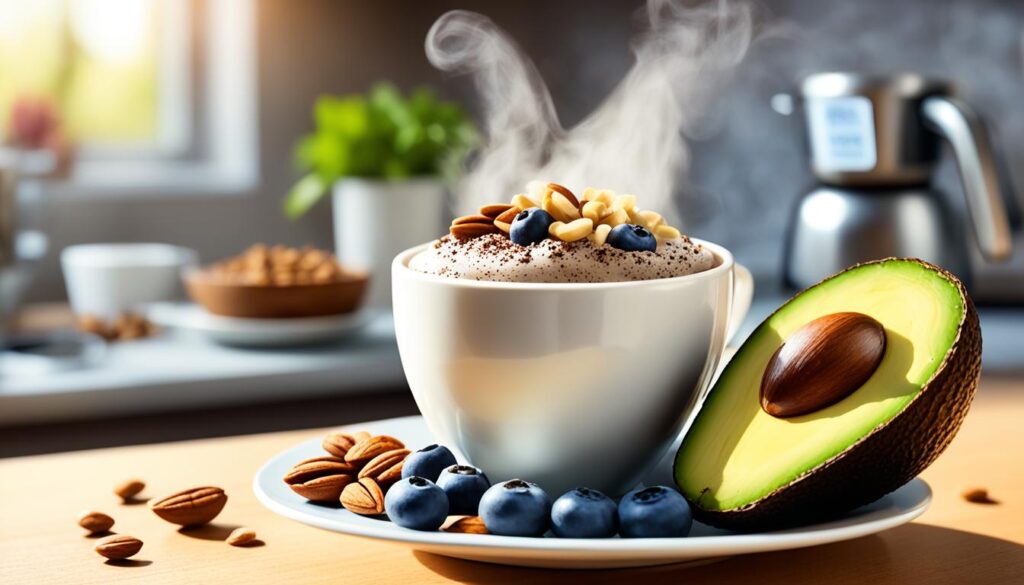
Research on coffee and NAFLD is still new. So, check with a doctor before changing your habits. The right mix of natural care and medical help can improve your liver health and reduce NAFLD effects.
Get Active
It’s vital to include regular physical activity in your life. This helps manage nonalcoholic fatty liver disease (NAFLD). Exercise greatly improves liver health and cuts down the chance of heart disease and type 2 diabetes.
Exercise Guidelines for NAFLD
The Physical Activity Guidelines for Americans say people with NAFLD should aim for 150 minutes of moderate exercise each week. Try activities like brisk walking or swimming. Speaking with your doctor first is wise to pick the best plan for you.
Regular exercise for fatty liver disease brings lots of pluses. The physical activity guidelines for NAFLD show that exercise can cut down on liver fat. It can also boost how your body uses insulin and lower the odds of your sickness getting worse.

Making exercise for fatty liver disease part of your day aids in managing your NAFLD. It supports your liver’s overall health. Always start slowly and then increase your exercise slowly to prevent getting hurt. The big secret is to keep at it regularly.
Avoid Foods with Added Sugars
If you have NAFLD, watch how much sugary foods and drinks you eat. Sugary items like fructose and sucrose can make NAFLD worse. They are in many processed foods and drinks. This leads to more fat in your liver.
To help NAFLD, cut down on sugars. Use these tips to find and eat less sugar:
- Look at labels to find added sugars. They might be called sucrose, high-fructose corn syrup, honey, or agave.
- Stay away from sugary drinks like soda, fruit juices, or sweet coffees and teas.
- Try not to eat too many sweets, baked goods, or processed snacks.
- Eat more fresh fruits and veggies. They’re tasty and good for you.
- Eat whole foods when you can, to avoid extra sugars.
Watching your sugar and picking better foods can help your liver. It also makes it easier to deal with NAFLD symptoms.
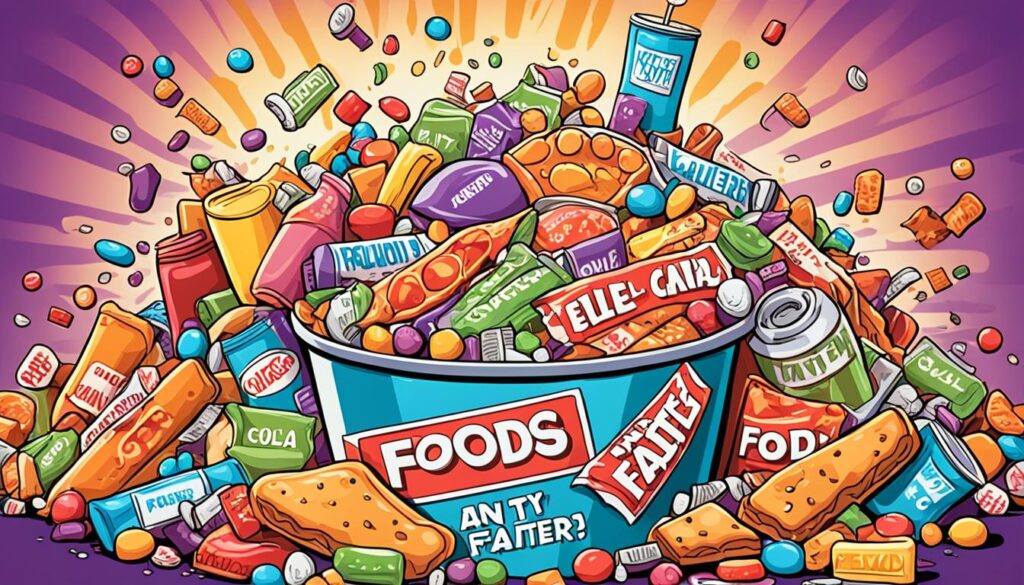
Target High Cholesterol
Having NAFLD makes it harder to keep cholesterol in check. It can make heart disease risk higher. Cut back on saturated and trans fats to fight high cholesterol.
Try to eat more omega-3s. They can lower cholesterol and help your liver. The Mediterranean diet is great for this. It’s all about plants and good fats.
Losing weight helps too. Your doctor might also suggest medicines for your cholesterol.
- Limit saturated and trans fats to manage high cholesterol associated with NAFLD
- Increase intake of healthy omega-3 fatty acids to support cholesterol regulation
- Adopt the Mediterranean diet, which can help lower cholesterol and benefit the liver
- Discuss cholesterol-lowering medications with your doctor if needed
- Maintain a healthy weight through diet and exercise to further support cholesterol management
Eating right, losing weight, and maybe using medicine can help. This combo is key in managing NAFLD. It lowers your heart disease risk. Always talk with your doctor about how to deal with high cholesterol and NAFLD.
Try an Omega-3 Supplement
If you have nonalcoholic fatty liver disease (NAFLD), think about taking omega-3s. These healthy fats come from fish, nuts, and seeds. They might lower liver fat and make your cholesterol better. This is what studies have found.
Omega-3 fatty acids are in fish oil. They help fight swelling, which is big in NAFLD getting worse. Using these could help your liver in many ways.
- Lower liver fat
- Better cholesterol
- Less liver swelling
Choose a supplement rich in EPA and DHA. These are the best omega-3s. Always talk to your doctor first before starting any new supplements. They will make sure it’s right for you.
Eating more fish or taking omega-3s can help. Things like salmon, mackerel, and sardines are good. Ask your doctor if taking omega-3s could help you.
Home remedies nonalcoholic fatty liver disease
If you have nonalcoholic fatty liver disease (NAFLD), you might search for natural ways to aid your liver. Making healthy lifestyle changes is key, such as losing weight, working out, and changing your. Some natural items might also help with NAFLD.
Aloe vera is one such home remedy. Research shows aloe vera can cleanse the blood and boost liver health. This may help the liver return to normal from fatty liver changes. Another good option is kutki root powder, it might also help with fatty liver disease.
It’s vital to talk to your doctor before trying these natural aids. Some could mix badly with medicines or even hurt your liver.
Other natural remedies that show promise in fighting NAFLD include:
- Apple cider vinegar: Taking apple cider vinegar regularly might help you lose weight, lower cholesterol, and improve liver health.
- Lemon: With lots of vitamin C and antioxidants, lemon defends liver cells and boosts their function.
- Turmeric: The active in turmeric, curcumin, fights inflammation and stress on the liver.
- Green tea: Green tea contains catechins that may support liver health and stop fat from building up in it.
- Amla: Amla, or Indian gooseberry, has vitamin C and quercetin. They can flush toxins from the liver and shield it from harm.
Always rely on your doctor’s advice when trying new natural or supplemental remedies, particularly if you have liver issues already.
Avoid Known Liver Irritants
Having a healthy liver is very important for your whole body. You need to watch out for things that could harm it. This is extra vital if you have NAFLD. Avoid stuff that makes your liver work harder.
Alcohol is a top problem. Even a little can make NAFLD worse. It’s smart not to drink any if you have a fatty liver. Also, watch out for some medicines. They can also stress your liver. Go see your doctor or pharmacist before trying anything new. Make sure it’s safe for your liver.
There are other things that can hurt your liver. These include:
- Certain prescription medicines
- High-dose vitamins and supplements
- Bad stuff in the air and water
Knowing about these bad things and avoiding them helps your liver. This is a big step in fighting NAFLD. Always remember, stopping liver damage before it starts is the best way. So, team up with your doctor. Make a plan that’s good for your liver in every way.
Ask Your Doctor About Vitamin E
Vitamin E helps fight against illness. It might lower swelling linked to NAFLD. The AASLD says taking 800 IU every day is good for NAFLD. This is for those without diabetes but who have confirmed NASH.
Taking vitamin E may be good for your liver’s health. But, always talk to your doctor first. Getting too much vitamin E can be bad. It can have risks, so it’s wise to check with a doctor before using it to help with NAFLD.
Risks and Benefits of Vitamin E
Vitamin E can boost how your liver works. It might stop NAFLD from getting worse. Here are some points to keep in mind:
- Vitamin E fights liver swelling, a big issue in NASH.
- Taking vitamin E might make your liver work better. It can lessen how much fat is in your liver if you have NAFLD.
- But, too much vitamin E (more than 400 IU daily) might up the chances of bleeding. This is especially true if you’re on blood thinners or have certain health problems.
- The AASLD advises 800 IU daily for NAFLD patients with NASH. But, they say to talk with a doctor first.
It’s really important to ask your doctor if vitamin E is right for you. They will help you see if it’s worth it, considering all the risks and benefits for your health and NAFLD.
Investigate Herbs and Natural Remedies
People might look for other ways to help their liver, like herbal supplements. But know that these are not medicine that doctors have checked. They could also cause problems with your other medicines. Before you use any herbs or supplements, talk to your doctor.
Herbs and spices like turmeric, milk thistle, green tea, gingery have shown some good signs. They have things in them that might help your liver. But, we still need more research to be sure. Nobody knows for sure if they really work yet.
Be careful with herbs and natural ways. They might not work well with your medicines. They could even make your liver worse. Always talk to your doctor before trying anything new. Your doctor can help you find the best ways to keep your liver healthy. This might include changes in what you eat, the way you live, and maybe some natural things.
FAQ
What is nonalcoholic fatty liver disease (NAFLD)?
NAFLD is when the liver has too much fat, but not from drinking a lot. Changing what you eat and exercise can really help.
What are the types of fatty liver disease?
Alcoholic fatty liver disease is from drinking too much alcohol. NAFLD happens without alcohol.
What are the risk factors for NAFLD?
Being very overweight, having type 2 diabetes, or high cholesterol and blood pressure all up your risk.
How much weight loss is recommended for improving NAFLD?
Losing just a little weight, 3-5%, is a good start. But, dropping 7-10% can really help make things better.
How can the Mediterranean diet help with NAFLD?
This diet helps lessen liver fat and improves health, even without dropping pounds. It’s full of plants and good fats.
How can coffee benefit those with NAFLD?
Coffee helps your liver fight swelling and cuts down on liver damage. Having 2-3 cups of black coffee daily does the trick.
What are the exercise recommendations for NAFLD?
We should aim for 150 minutes a week of activities like walking fast or swimming. Anything that gets your heart pumping works.
How do dietary sugars impact NAFLD?
Foods with a lot of sugar, like pastries and sweet drinks, can make NAFLD worse. They add more fat to your liver.
How can managing cholesterol help with NAFLD?
Cholesterol can get out of hand with NAFLD, raising heart risk. Eating right fats and avoiding bad fats help keep it in check.
What are the potential benefits of omega-3 supplements for NAFLD?
Omega-3s, found in fish and some nuts, could help. They lower liver fat and improve cholesterol.
What natural home remedies have shown potential benefits for NAFLD?
Aloe vera cleans the blood and helps the liver. Kutki root powder may undo fatty liver, but ask your doctor before trying these.
What substances should be avoided with NAFLD?
Avoid things that stress the liver, like too much alcohol or some medicines and vitamins. It’s important to be careful about what you take.
How can vitamin E be beneficial for NAFLD?
Vitamin E, an antioxidant, fights liver inflammation. If you have NAFLD but not diabetes, 800 IU of Vitamin E daily is okay.
What other herbs and spices have shown potential benefits for NAFLD?
Turmeric, milk thistle, green tea, ginger, and garlic are good for your liver. Yet, always talk to your doctor first before using them.


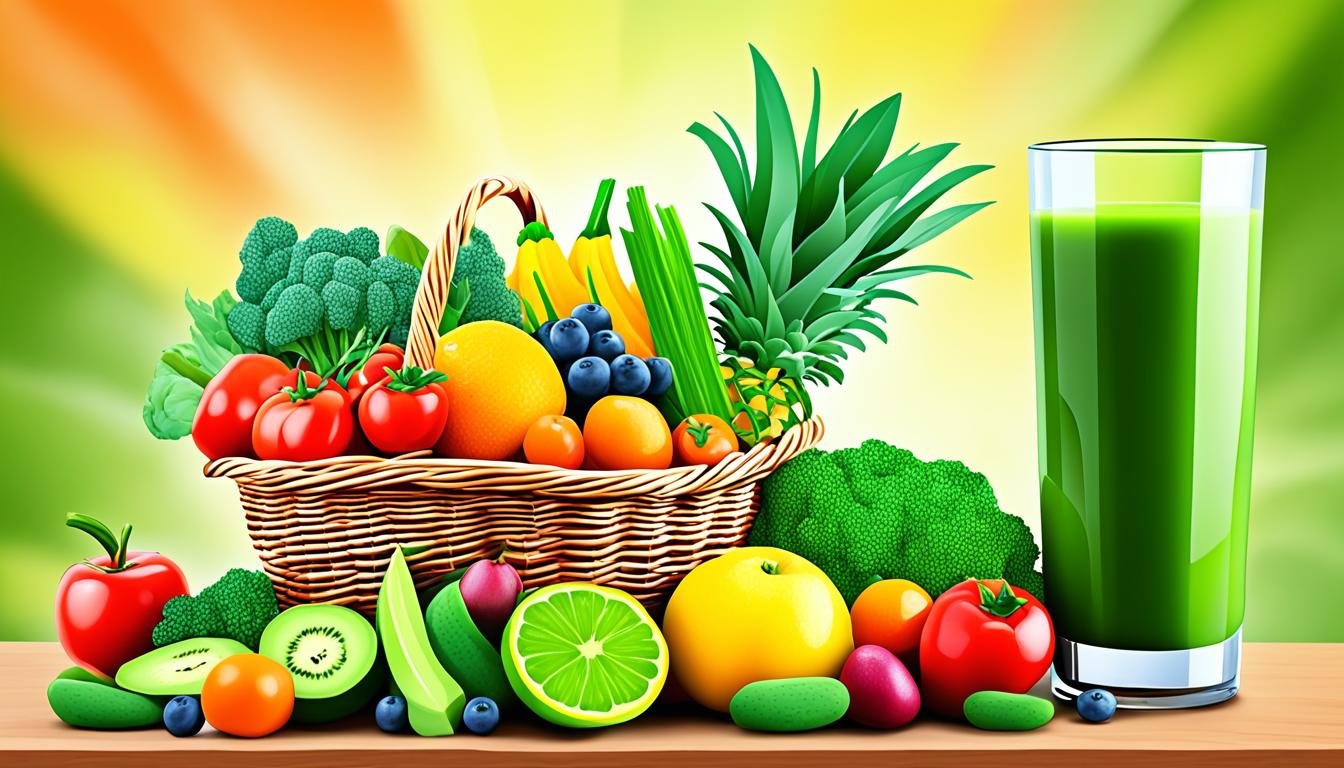
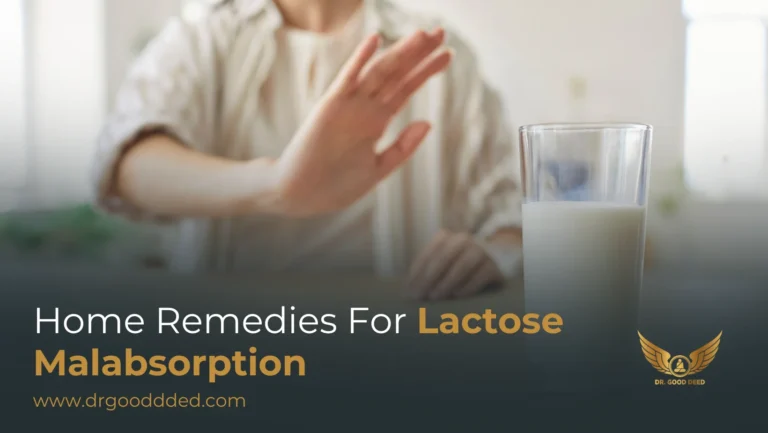
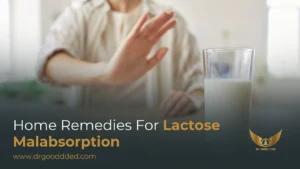
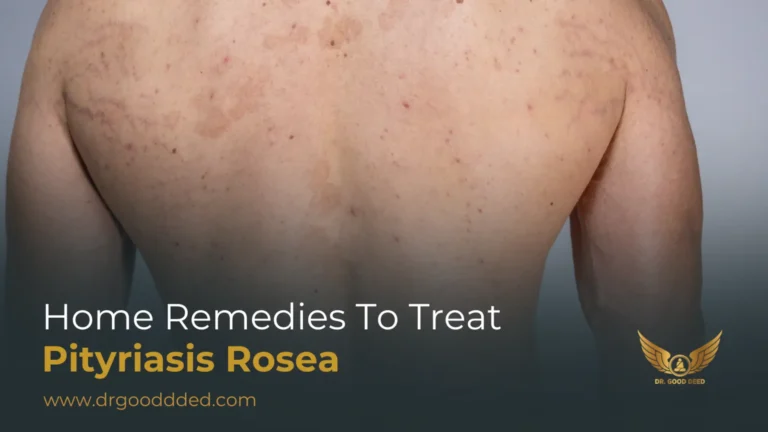
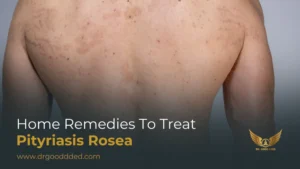









Leave a Comment